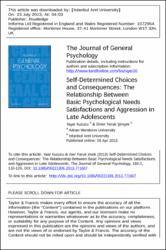Ara
Toplam kayıt 10, listelenen: 1-10
I am so happy ‘cause my best friend makes me feel unique: friendship, personal sense of uniqueness and happiness
(Springer, 2013)
Decades of empirical research leave no doubt that friendship experiences are consistent correlates of happiness. Yet, little is known about how friendships are related to happiness. The present study examined personal sense ...
Differences in how trait emotional intelligence predicts life satisfaction: the role of affect balance versus social support in India and Germany
(Springer, 2013)
In this study, we assessed cross-cultural differences in the extent to which general emotional intelligence is linked to life satisfaction and analyzed mediators of this relationship. We used data from an individualistic ...
Parental support for basic psychological needs and happiness: The importance of sense of uniqueness
(Springer, 2013)
Past empirical research relying on self-determination theory (SDT) has consistently shown that parental support of basic psychological needs (BPN) is associated with adolescent happiness. Yet, the specific mechanisms ...
Structural relations of personal and collective self-esteem to subjective well-being: attachment as moderator
(Springer, 2013)
A model indicating that the relationship between collective self-esteem and indicators of subjective well-being, happiness and life satisfaction, was mediated by personal self-esteem was tested by structural equation ...
Relationship of the gap between experience and language with mental health in adolescence: the importance of emotion regulation
(Taylor & Francis, 2013)
Although past research has provided important information about the relationship between language use and mental health in the period of adolescence, the role of intervening variables in this association has been seriously ...
Linking metatraits of the big five to well-being and ill-being: do basic psychological needs matter?
(Springer, 2013)
There is considerable evidence that two higher order factors underlie the Big-Five dimensions and that these two factors provide a parsimonious taxonomy. However, not much empirical evidence has been documented as to the ...
The need for absolute truth and self-rumination as basic suppressors in the relationship between private self-consciousness and mental health
(Taylor & Francis, 2013)
Self-reflection has not so far been shown to have any specific benefits for mental health except for self-knowledge. Recent research showed that the controversy concerning the relationship between self-reflection and mental ...
Self-absorption paradox is not a paradox:Illuminating the dark side of self-consciousness
(Elsevier, 2013)
Although considered an important component of a healthy personality, self-reflection has not so far been shown to have any specific benefits for mental health. This research addresses this issue by taking into consideration ...
The relationship between language use and depression: illuminating the importance of self-reflection, self-rumination, and the need for absolute truth
(Taylor & Francis, 2013)
The main aim of the present study was to provide additional knowledge about the mediatory processes through which language relates to depression. Although previous research gave clear evidence that language is closely ...
Self-determined choices and consequences: the relationship between basic psychological needs satisfactions and aggression in late adolescents
(Taylor & Francis, 2013)
This research examined the mediatory role of life purpose and career indecision in the relationship between the satisfaction of basic psychological needs and aggression. Data were collected from high school students (n = ...

















